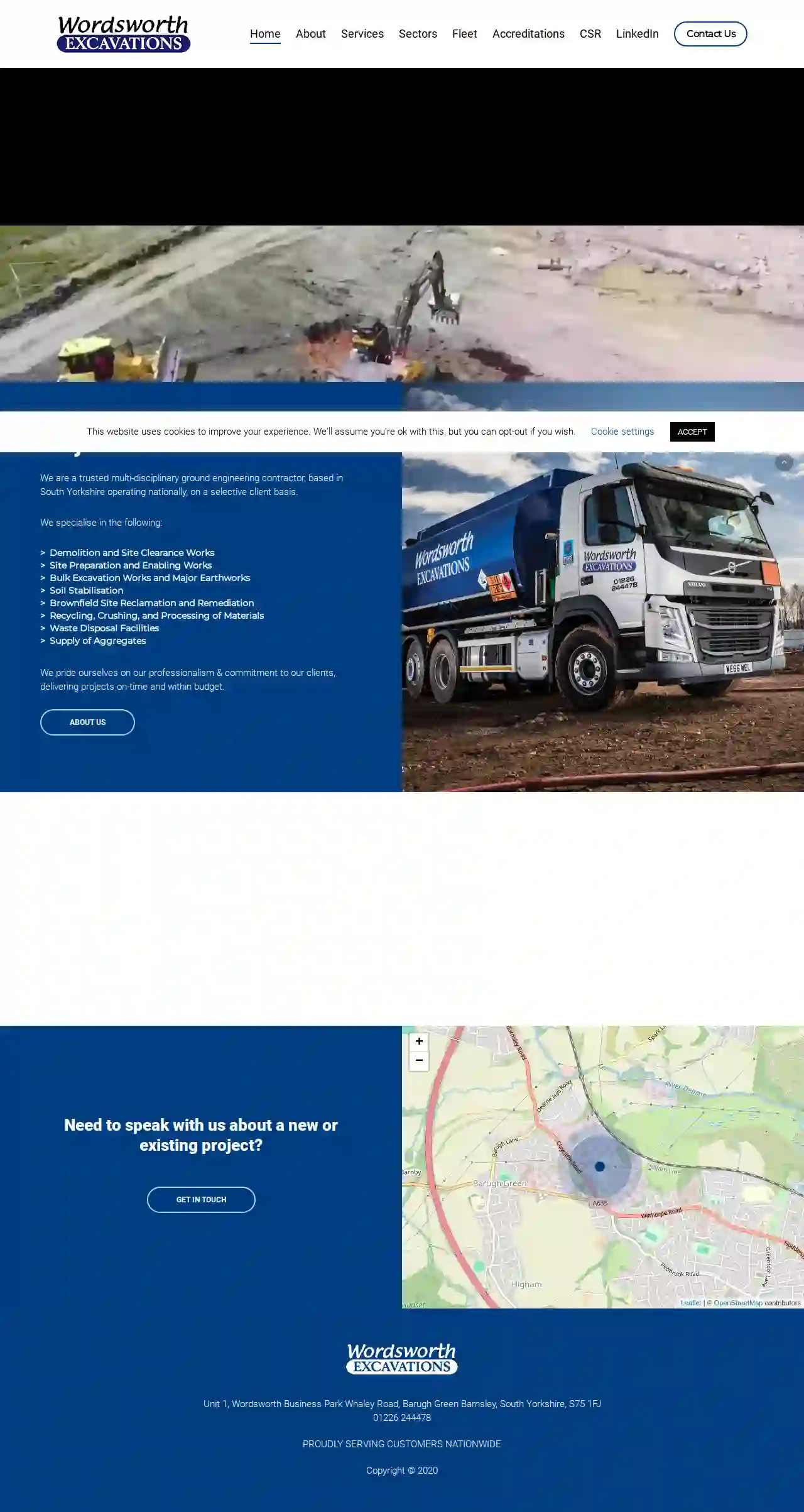Excavation Contractors Darfield
Top 10 Excavation Services in Darfield
Receive 3 FREE Digging Contractors quotes for your project today! Compare profiles, reviews, accreditations, portfolio, etc... and choose the best service.

Kt Excavations Ltd
51 reviewsUnit 71, Albion Road, Carlton Ind Est, Carlton, Barnsley, S71 3HW, GBFrom Ground Up, We're Your Trusted Partner. Professional Excavations & Groundwork Services in Barnsley Welcome to KT Excavations, your dedicated partners in bringing your projects to life. With many years of industry experience, we've honed our craft to deliver unparalleled quality, precision, and reliability. We have a strong team of skilled professionals who will work with you from site preparation to foundation laying, and so much more. Our comprehensive suite of services is tailored to meet the unique needs of each project, ensuring optimal results every step of the way. Whether you're a homeowner embarking on a residential construction project or a commercial developer undertaking a large-scale endeavor, we will deliver exceptional results that stand the test of time.
- Services
- Why Us?
- Testimonials
- Gallery
Get Quote
Braithwaite Excavations & Demolitions Ltd
3.73 reviewsBarnsley, GBThis domain name is parked for FREE by fasthosts.co.uk. Looking to buy a similar domain? Start search. Do more with your domain. Access all the tools you need for online success. Find out more. Need help? Our friendly experts are here 24/7 to answer your domain questions, from registering a similar domain to connecting your domain name to your site. Contact us.
- Services
- Why Us?
- Gallery
Get Quote- Ba
Barrett Excavation Ltd
56 reviewsBarnsley, GB- Services
- Why Us?
Get Quote 
Jakto Transport Ltd - Excavations, Demolitions and Groundworks
4.814 reviewsBarnsley, GB- Services
- Why Us?
Get Quote- G.
G.A.Siddons
4.25 reviewsBarnsley, GB- Services
- Why Us?
Get Quote 
Wordsworth Excavations
3.919 reviewsBarnsley, GB- Services
- Why Us?
Get Quote- Og
Ogdens Excavation Ltd
52 reviewsBarnsley, GB- Services
- Why Us?
Get Quote - Ee
Eezi Dig Groundworks & Excavations
51 reviewsBarnsley, GB- Services
- Why Us?
Get Quote
Over 13,059+ Excavation Contractors on our directory
Our excavation experts operate in Darfield and surrounding areas!
ExcavationHQ has curated and vetted Top Excavation Contractors in and around Darfield. Find the most trustworthy business today.
Frequently Asked Questions About Excavation Contractors
- Determine the Area: Measure the length and width of the area you want to fill. Multiply them to get the area in square feet (or meters).
- Determine the Depth: Measure the difference between the existing grade and the desired grade (how much you need to raise the ground). This is the depth of fill required.
- Calculate Volume: Multiply the area (step 1) by the depth (step 2) to get the volume in cubic feet (or meters).
- Account for Compaction: Fill dirt compacts when it settles, so add 10% to 25% to the calculated volume to account for compaction. The exact percentage depends on the type of fill material.
- Spring and Fall: Often considered favorable due to moderate temperatures and drier soil conditions.
- Summer: Can be suitable, but hot weather can make working conditions challenging and might require additional measures (shade, hydration) for workers.
- Winter: Excavation in winter can be more difficult due to frozen ground, snow, and potential delays caused by inclement weather. It might also require specialized equipment or techniques.
- Trench Collapses: Unstable trench walls can cave in, posing a severe risk to workers. Proper shoring and sloping are crucial safety measures.
- Utility Damage: Striking underground utilities (gas, water, electric) can cause leaks, explosions, or electrocution. Accurate utility locates and careful digging are essential.
- Falling Objects: Materials or equipment falling into excavations can injure workers. Securing work areas and using appropriate safety gear is vital.
- Equipment Accidents: Operating heavy machinery involves risks of rollovers, collisions, or mechanical failures. Trained operators and proper equipment maintenance are critical.
- Environmental Hazards: Excavated soil might contain hazardous materials (asbestos, lead). Proper testing and disposal procedures are necessary.
- Clear the Area: Remove any obstacles, including vehicles, outdoor furniture, landscaping features, or structures, from the excavation zone and surrounding area.
- Mark Existing Features: Identify and mark underground utilities, septic tanks, sprinkler systems, or other buried elements you want to protect.
- Protect Landscaping: Use tarps or fencing to shield trees, shrubs, gardens, or other landscaping elements from damage.
- Provide Access: Ensure the excavation contractor has clear access to the work area, including gates wide enough for equipment.
- Discuss Logistics: Coordinate with the contractor regarding parking arrangements, material delivery, and any special instructions or concerns you might have.
How do I calculate how much dirt I need for fill?
What is the best time of year for excavation?
What are the risks associated with excavation?
How do I prepare my property for excavation?
How do I calculate how much dirt I need for fill?
- Determine the Area: Measure the length and width of the area you want to fill. Multiply them to get the area in square feet (or meters).
- Determine the Depth: Measure the difference between the existing grade and the desired grade (how much you need to raise the ground). This is the depth of fill required.
- Calculate Volume: Multiply the area (step 1) by the depth (step 2) to get the volume in cubic feet (or meters).
- Account for Compaction: Fill dirt compacts when it settles, so add 10% to 25% to the calculated volume to account for compaction. The exact percentage depends on the type of fill material.
What is the best time of year for excavation?
- Spring and Fall: Often considered favorable due to moderate temperatures and drier soil conditions.
- Summer: Can be suitable, but hot weather can make working conditions challenging and might require additional measures (shade, hydration) for workers.
- Winter: Excavation in winter can be more difficult due to frozen ground, snow, and potential delays caused by inclement weather. It might also require specialized equipment or techniques.
What are the risks associated with excavation?
- Trench Collapses: Unstable trench walls can cave in, posing a severe risk to workers. Proper shoring and sloping are crucial safety measures.
- Utility Damage: Striking underground utilities (gas, water, electric) can cause leaks, explosions, or electrocution. Accurate utility locates and careful digging are essential.
- Falling Objects: Materials or equipment falling into excavations can injure workers. Securing work areas and using appropriate safety gear is vital.
- Equipment Accidents: Operating heavy machinery involves risks of rollovers, collisions, or mechanical failures. Trained operators and proper equipment maintenance are critical.
- Environmental Hazards: Excavated soil might contain hazardous materials (asbestos, lead). Proper testing and disposal procedures are necessary.
How do I prepare my property for excavation?
- Clear the Area: Remove any obstacles, including vehicles, outdoor furniture, landscaping features, or structures, from the excavation zone and surrounding area.
- Mark Existing Features: Identify and mark underground utilities, septic tanks, sprinkler systems, or other buried elements you want to protect.
- Protect Landscaping: Use tarps or fencing to shield trees, shrubs, gardens, or other landscaping elements from damage.
- Provide Access: Ensure the excavation contractor has clear access to the work area, including gates wide enough for equipment.
- Discuss Logistics: Coordinate with the contractor regarding parking arrangements, material delivery, and any special instructions or concerns you might have.